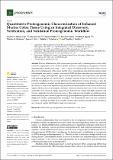Quantitative Proteogenomic Characterization of Inflamed Murine Colon Tissue Using an Integrated Discovery, Verification, and Validation Proteogenomic Workflow
Author(s)
Rajczewski, Andrew T.; Han, Qiyuan; Mehta, Subina; Kumar, Praveen; Jagtap, Pratik D.; Knutson, Charles G.; Fox, James G.; Tretyakova, Natalia Y.; Griffin, Timothy J.; ... Show more Show less
Downloadproteomes-10-00011.pdf (4.715Mb)
Publisher with Creative Commons License
Publisher with Creative Commons License
Creative Commons Attribution
Terms of use
Metadata
Show full item recordAbstract
Chronic inflammation of the colon causes genomic and/or transcriptomic events, which can lead to expression of non-canonical protein sequences contributing to oncogenesis. To better understand these mechanisms, <i>Rag2</i><sup>−/−</sup><i>Il10</i><sup>−/−</sup> mice were infected with <i>Helicobacter hepaticus</i> to induce chronic inflammation of the cecum and the colon. Transcriptomic data from harvested proximal colon samples were used to generate a customized FASTA database containing non-canonical protein sequences. Using a proteogenomic approach, mass spectrometry data for proximal colon proteins were searched against this custom FASTA database using the Galaxy for Proteomics (Galaxy-P) platform. In addition to the increased abundance in inflammatory response proteins, we also discovered several non-canonical peptide sequences derived from unique proteoforms. We confirmed the veracity of these novel sequences using an automated bioinformatics verification workflow with targeted MS-based assays for peptide validation. Our bioinformatics discovery workflow identified 235 putative non-canonical peptide sequences, of which 58 were verified with high confidence and 39 were validated in targeted proteomics assays. This study provides insights into challenges faced when identifying non-canonical peptides using a proteogenomics approach and demonstrates an integrated workflow addressing these challenges. Our bioinformatic discovery and verification workflow is publicly available and accessible via the Galaxy platform and should be valuable in non-canonical peptide identification using proteogenomics.
Date issued
2022-04-14Department
Massachusetts Institute of Technology. Department of Biological EngineeringPublisher
Multidisciplinary Digital Publishing Institute
Citation
Proteomes 10 (2): 11 (2022)
Version: Final published version